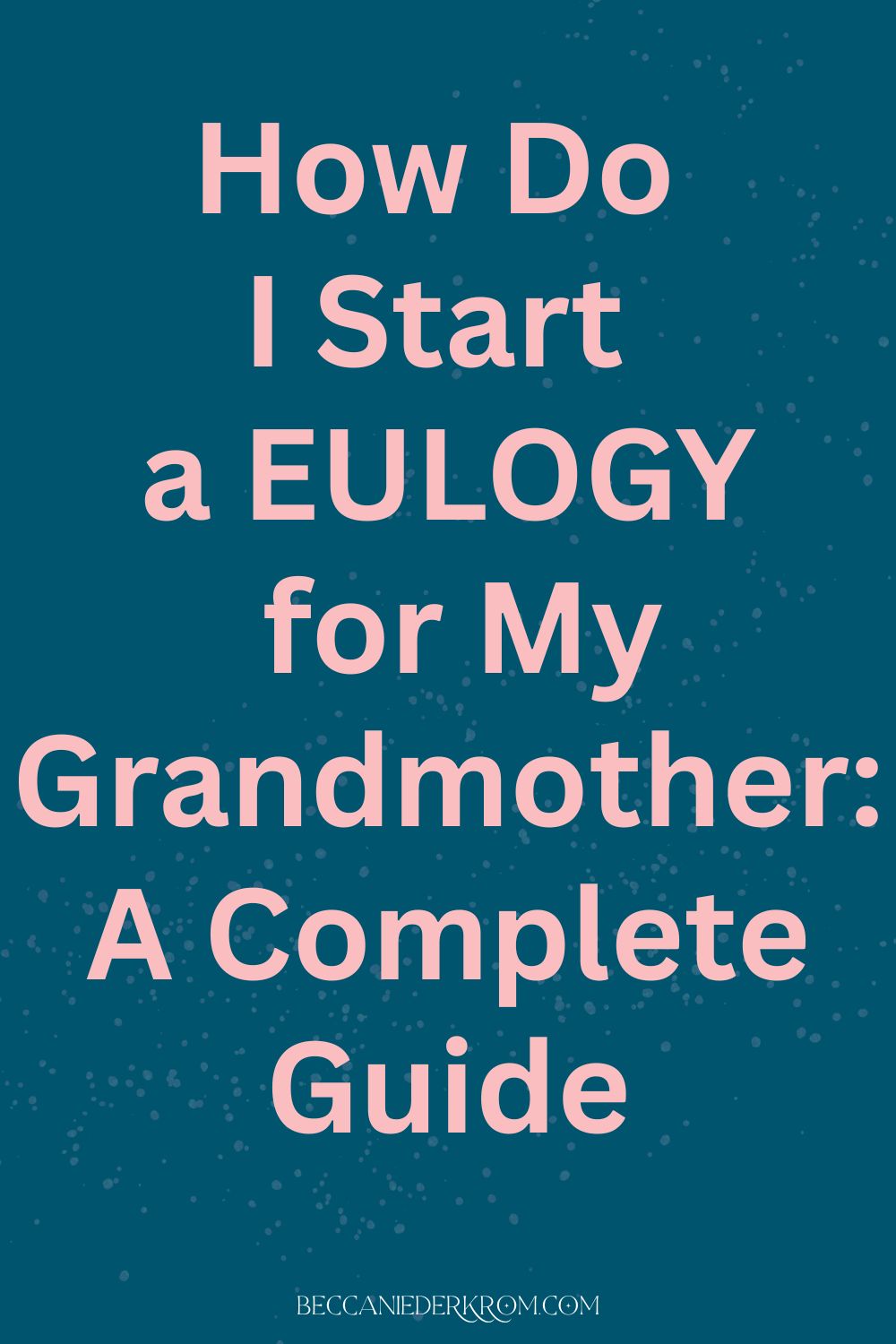We may earn money or products from the companies mentioned in this post. As an Amazon Associate I earn from qualifying purchases. Disclosure of Material Connection: Some of the links in this post may be "affiliate links." This means if you click on the link and purchase an item, I will receive an affiliate commission.
Facing the task of writing a eulogy for your grandmother can feel overwhelming during an already emotional time. The blank page seems especially daunting when you’re trying to capture a lifetime of love and memories into words that honor her legacy. If you’re wondering “how do I start a eulogy for my grandmother,” you’re not alone. This guide will walk you through the process with sensitivity, practical advice, and examples to help you craft a meaningful tribute.
How Do I Start a Eulogy for My Grandmother: A Complete Guide
Understanding the Purpose of a Eulogy
Before putting pen to paper, it helps to understand what a eulogy aims to accomplish. A eulogy for your grandmother serves several important purposes:
- It celebrates her unique life and personality
- It acknowledges your shared grief while offering comfort
- It helps those present remember her fondly
- It creates a meaningful moment of closure for family and friends
With these goals in mind, let’s explore how to begin this important tribute.
First Steps: Gathering Your Thoughts
Before writing the actual opening lines, take some time to reflect and gather your thoughts about your grandmother:
- Collect memories and stories – Jot down special moments, phrases she often used, or traditions she maintained
- Identify her defining qualities – Was she known for her wisdom, humor, generosity, or strength?
- Consider her impact – How did she influence your life and the lives of others?
- Talk to family members – Gather perspectives and memories from others who loved her
This preparation will give you a rich foundation of material to draw from when crafting your opening.
7 Effective Ways to Start a Eulogy for Your Grandmother
1. Begin with Gratitude
One of the most graceful ways to open a eulogy is by expressing appreciation—both for those who have gathered to honor your grandmother and for having had her in your life.
Example: “Thank you all for being here today to celebrate the remarkable life of my grandmother, Margaret. As I look around this room, I’m reminded of how many lives she touched and how deeply she was loved. I’m grateful for the privilege of sharing a few words about a woman who shaped so much of who I am today.”
2. Start with a Defining Memory
Opening with a specific, vivid memory can immediately bring your grandmother’s presence into the room and set the tone for your tribute.
Example: “Every Sunday afternoon for as long as I can remember, my grandmother’s kitchen would fill with the aroma of her famous apple pie. She would let me help cut the apples, carefully showing me how to make each slice just right. ‘Patience,’ she would say, ‘is the secret ingredient in both baking and living.’ That patience, that attentiveness to life’s details, defined how my grandmother moved through the world.”
3. Share Her Full Name and a Character Statement
A straightforward but powerful opening simply states your grandmother’s name followed by a statement about her core essence.
Example: “Eleanor Grace Johnson was a force of nature. My grandmother never simply entered a room—she transformed it with her energy, her warmth, and her uncanny ability to make every single person feel like they were the most important one there.”
4. Begin with a Meaningful Quote
If there was a saying, poem, or passage that was meaningful to your grandmother or that captures her spirit, this can serve as a powerful opening.
Example: “‘Life is not measured by the number of breaths we take, but by the moments that take our breath away.’ My grandmother, Claire, lived by these words. She taught us to treasure the extraordinary within the ordinary, to find wonder in everyday moments.”
5. Acknowledge Your Emotions
Being honest about your feelings creates an authentic connection with those listening and honors the significance of your loss.
Example: “Standing here today to speak about my grandmother feels both impossible and necessary. The grief is still raw, the absence still shocking. Yet I know that Grandma Rose would want us to find strength in our shared memories, to find laughter among our tears.”
6. Use a Metaphor That Captures Her Essence
A thoughtful metaphor can beautifully encapsulate your grandmother’s character and impact.
Example: “My grandmother was like a lighthouse—steady, reliable, and always guiding us safely home through life’s storms. Her light didn’t dim with age; if anything, it grew stronger, more essential to all who knew her.”
7. Begin with Her Life Philosophy
If your grandmother had a particular outlook on life or a mantra she lived by, this can be a meaningful starting point.
Example: “‘There’s no problem so big that a cup of tea and a good chat can’t help solve.’ This wasn’t just something my grandmother said—it was how she lived. Martha Jensen’s kitchen table was more than a place for meals; it was a sanctuary where worries were shared, tears were dried, and wisdom was dispensed alongside her perfect Earl Grey.”
Common Challenges When Starting a Eulogy
Overwhelming Emotion
It’s entirely normal to feel overcome with emotion when preparing or delivering a eulogy. Consider these approaches:
- Acknowledge your feelings rather than trying to suppress them
- Practice reading your eulogy aloud several times before the service
- Arrange for someone to be ready to step in if needed
- Remember that tears are a testament to your love, not a weakness
Finding the “Right” Words
Many people feel pressure to find perfect, profound words. Remember:
- Authenticity resonates more than perfection
- Simple, heartfelt language often carries more impact than elaborate prose
- Your grandmother would value your genuine expression over literary brilliance
Balancing Grief and Celebration
A eulogy walks the delicate line between acknowledging loss and celebrating life:
- It’s appropriate to acknowledge the sadness of saying goodbye
- Balance expressions of grief with joyful memories and gratitude
- Consider how your grandmother would want to be remembered
Writing the Rest of Your Eulogy
Once you’ve crafted a strong opening, continue your eulogy by:
- Sharing meaningful stories that illustrate who she was
- Highlighting her values and contributions to family and community
- Describing the lessons she taught and her lasting impact
- Including touches of appropriate humor if it reflects her personality
- Closing with a meaningful farewell that offers comfort
Final Thoughts on Honoring Your Grandmother
Starting a eulogy for your grandmother is perhaps the hardest part of writing it. Remember that your words, however imperfect they might seem to you, are a gift to everyone who gathers to remember her. Your grandmother’s love for you doesn’t require eloquence to be honored—it simply asks for your authentic voice and heart.
By beginning with genuine feeling, specific memories, and a clear sense of who she was, you create a foundation for a eulogy that truly celebrates her unique life. In sharing your personal connection to your grandmother, you invite others to reflect on their own special memories, creating a collective tribute to the woman who meant so much to all of you.
The love between a grandmother and grandchild is a precious bond that transcends even death. Your eulogy isn’t really an ending—it’s a way of ensuring that her wisdom, her love, and her spirit continue to influence and inspire, not just in your life but in the lives of all who were fortunate enough to know her.



